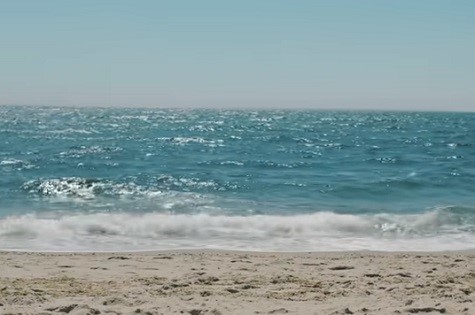Horror is about existing as a human. Existing as we do, with imagination and logic, with consciousness of past, present and future, means fear — fear of pain, fear of loss, fear of no longer existing. Horror often overlaps with science fiction, but science fiction can go to other places. It can be non-human. Or anti-human.
The Beach House begins with ominous waters and empty shores as young people Emily (Liana Liberato) and Randall (Noah Le Gros, very obviously the son of James) arrive at Randall’s father’s beach house on Cape Cod in May, before the start of tourist season. Other cottages are within eyesight but not too close, and empty regardless. But their house turns out to be occupied — Randall, somewhat estranged from his father, never told him about the trip, and apparent family friends are there. Jane (Maryann Nagel) and Mitch (Jake Weber) are an older couple who seem comfortable with each other but slightly off, Jane has a large amount of prescription pill bottles. Emily and Randall are an uncertain couple themselves, Randall is a slacker doof who wants Emily to just hang out with him and forgo her grad students of astrobiology — as she describes it, the study of life that may exist on Earth but in near-alien conditions, like the bottom of the sea.
In his feature debut, longtime location manager Jeffrey A. Brown uses his main set of the house well, it’s cozy enough but not entirely familiar, and lets his characters’ unfamiliarity with each other keep possible plots open. Are Jane and Mitch on the level? Will Emily and Randall’s differences be prodded further apart by this example of stability? This openness drags a bit, but as the foursome runs out of booze at dinnertime, Randall brings out some edibles and the whole evening takes the turn of an unsettling trip. Brown turns up the blur on the edges of his characters and objects to heighten their instability. Is everything really happening? In particular, is the odd bioluminescence that lures Jane down to the beach a hallucination or not? Is the similarly glowing haze covering the beach and moving into the house a true fog or a fiction?
Brown keeps the uneasiness going for a little while after everyone wakes up the next day in various stages of disarray from their bad trip. But then he makes the turn. Mitch walks into the surf and sinks below the waves (in a static wide shot that lets you know exactly what is going to happen and takes its time letting you take that in), and when Emily runs after him she’s burned by one of many odd jellyfish-like sacs that have washed ashore, and a worm tunnels its way into the wound. And what is churning in and sweating out of the bodies of Jane and Randall?
There are smart signifiers of a wider apocalypse in this low-budget movie — all TV channels showing an emergency broadcast image (THIS IS NOT A TEST), snippets of a radio broadcast where we here someone from the National Oceanic and Atmospheric Administration — that shut down the possibility of rescue and give just enough context to imagine things worse. That increases the fear. “Extinction-level event” comes through in one of the radio’s few moments of clarity. Did you know in the Permian extinction, more than 80 percent of terrestrial life and 95 percent of ocean life died? And then the dinosaurs came.
A movie in 2020 about humans beset by internal invaders, and their flailing and futile reactions to the invasion, will of course draw coronavirus parallels. But the story of the coronavirus is largely of human stupidity, we’ve managed to make the plague about us in our vanity and incompetence. While the characters here make some foolish decisions (anyone who tried edibles once and had a very bad experience and has never done so again may experience some puritanical scorn at their pot party) there is something larger at play in The Beach House that is beyond any human choices.
At that point, is fear even a useful response? Fear keeps humans alive, fight or flight, but humans do not seem to have much of a future here, no more than those trilobites did hundreds of millions of years ago, when a switch flipped and methane began bubbling out of the depths of the sea. As the remaining characters of The Beach House struggle on in agony, the overwhelming fog, boldly lit orange and purple by flashes of abandoned emergency vehicles, gives them nowhere to go. When fear won’t let you run or stand your ground, then comes despair. And maybe acceptance of leaving humanity behind. The movie ends with one person waiting for the final dissolution, saying one thing over and over: “Don’t be afraid.”
The Beach House is streaming on Shudder.

